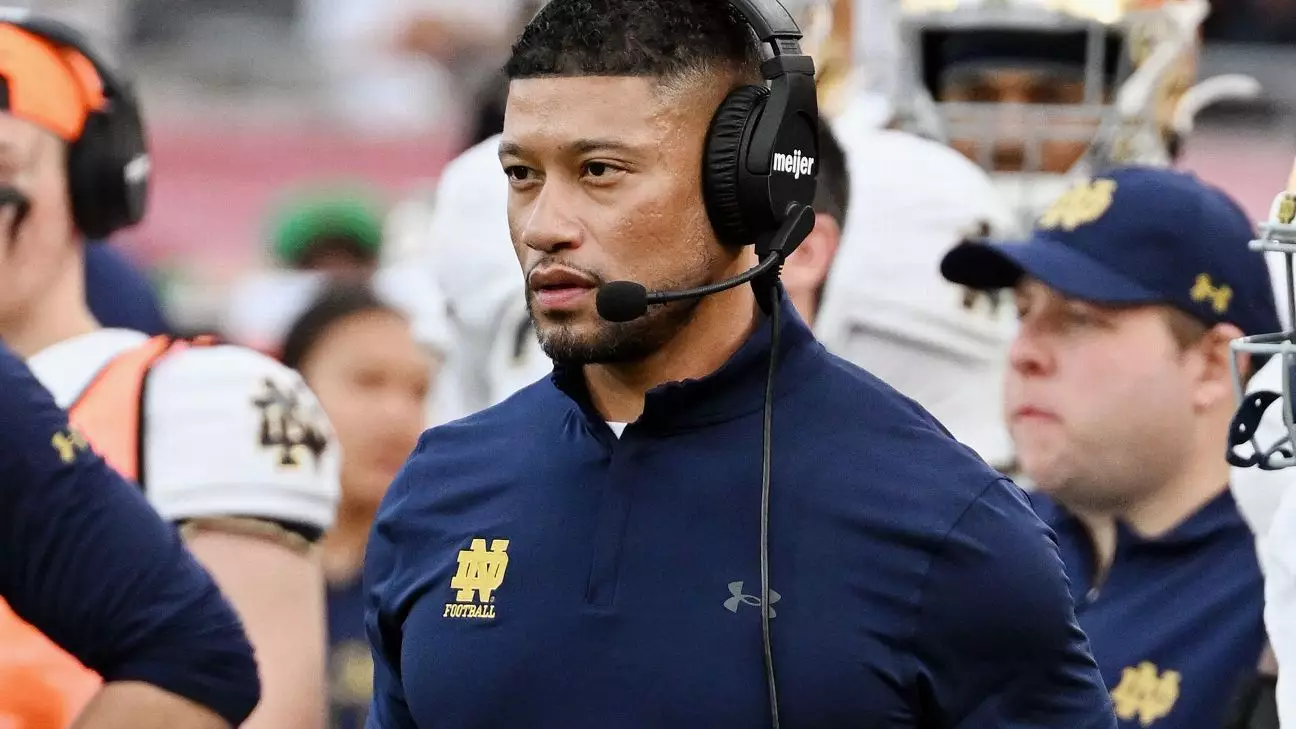The forthcoming College Football Playoff Semifinal at the Capital One Orange Bowl is poised to be a momentous occasion not only for the schools involved—Notre Dame and Penn State—but also for the entire landscape of college football. Coaches Marcus Freeman and James Franklin find themselves on the cusp of making history; either one has the potential to become the first Black head coach to lead a team to the national championship game. This milestone speaks volumes about the slow but notable progress toward diversity and inclusion within the coaching ranks of college athletics. In the eyes of both coaches, the impending matchup serves as more than just a game; it represents an opportunity to inspire future generations.
In his reflections, Franklin drew parallels to his experiences during Super Bowl XLI in 2007, where the NFL witnessed its first championship matchup featuring Black head coaches—Tony Dungy and Lovie Smith. At that time, Franklin held the role of offensive coordinator at Kansas State, under the guidance of another Black head coach, Ron Prince. The sense of pride and hope towards greater inclusion was palpable. Franklin’s anecdote reveals a broader concern among coaches: the impact of visibility and representation on the coaching profession itself. It prompts questions about equity in hiring practices and whether groundbreaking moments like these will pave the way for more opportunities for aspiring coaches of color.
The landscape has changed since that Super Bowl. Franklin noted the increase from six to 16 Black head coaches across 134 FBS programs. Although the change may seem incremental to some, it is significant for many others. As Franklin aptly puts it, incremental change can still have a monumental impact on the opportunities available for young coaches entering the field. “At the end of the day,” he asserts, “you just want an opportunity.” His voice resonates with many who have long awaited the chance to showcase their skills and aspirations in a historically dominated space.
Freeman’s insights bring an additional layer of complexity to the discussion. He not only represents the African American community in his role but also identifies as half-Korean, a recognition of his diverse heritage. By openly embracing his dual identity, Freeman acknowledges the vast array of experiences individuals like him can bring to the table. This self-awareness contributes to his understanding of the responsibility he bears in representing various groups within his sphere of influence.
Yet Freeman articulates that his focus should extend beyond personal representation; it must encompass his commitment to collective achievement. “More than anything, I want to achieve team glory with this program,” he insists. This statement echoes a fundamental truth—success in sports is not merely about personal accolades, but about uniting individual talents toward a common goal. Freeman’s perspective is refreshing, as it exemplifies a leader who prioritizes collaboration and unity over self-aggrandizement.
The nuanced role of coaches like Freeman and Franklin goes beyond just game-day tactics. They are also mentors seeking to inspire the next generation of athletes and coaches. When Freeman discussed the importance of mentoring young coaches, he grounds his approach in actionable steps aimed at creating a lasting impact: “If you want to impact the young people in this profession, you probably should do things to help them.” His humility and willingness to amplify the voices of aspirants prove vital to fostering an inclusive culture that promotes their development.
Franklin, too, is conscious of the significance of his role, both as a competitor and as a leader. “I’m honored to represent Penn State and the young men in that locker room,” he shared. This sentiment mirrors his understanding of the greater weight attached to their professional trajectories. The subtle yet powerful acknowledgment of obligation to speak for those who come after them enhances the game’s narrative, imbuing it with an aspirational dimension.
As the capital of college football gears up for this unparalleled faceoff, the stakes entail much more than just victory on the field. Freeman and Franklin symbolize hope, change, and the potential for a more diverse future in coaching. Their shared journey toward history signifies that every game played is also a path toward greater equity. The lessons borne from this moment extend well beyond the confines of the football field; they challenge individuals and institutions alike to embrace diversity and foster opportunities for all aspiring leaders in the sport.

